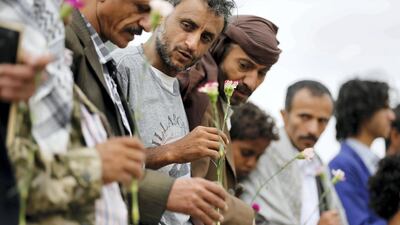The Houthi-controlled Criminal Court in Yemen’s capital Sanaa held a new trial session for 24 members of the Bahai faith on Saturday, despite calls for the case to be dropped.
“The judge and the public prosecutor appeared confused because they know the trial is baseless,” said the Yemeni Initiative for Defending Bahai Rights in Sanaa.
“For the second time, the defendants' lawyer asked the prosecution to reply to the defence memo he already handed them requesting the lawsuit be dropped based on previous directives issued by the head of the Houthi Supreme Council, Mahdi Al Mashat said.
The judge has postponed the hearing until April 13 to allow the prosecution to reply to the memo.
The Houthi authorities controlling the Yemeni capital Sanaa called for the arrest of the 24 Bahai people in April 2017.
They were charged with working for foreign parties and “displaying rectitude of conduct in order to attract people to their faith”, the Bahai University reported.
The Yemeni Initiative for Defending Bahai Rights called for broader solidarity with Bahais to pressure the Houthis into dropping baseless trials.
It also wants the Iran-backed rebels to allow members of the community who were forcibly deported from Yemen to be able to return.
Followers of the Bahai faith in Yemen have suffered mounting discrimination in recent years with an increase in persecution, arbitrary detentions and forcible departure by Houthi authorities controlling Sanaa.
Abdullah Al Oulofi, Bahai spokesman for Yemen, told The National that the hearing on Saturday came as an extension of trials being conducted against the 24 since April 2017.
The charges were dropped after a decree issued by Mr Al Mashat in March 25, 2020.
The Houthi court conducting the prosecution said the decree was a “release order”, not a “pardon order”.
"Based on the orders of Mr Al Mashat, five Bahai prisoners of the 24 in this case were released along with Hamid bin Haydara and deported in July 2020," Mr Al Oulofi said.
"But after deporting Hamid and the other five who were released with him, the court continued the trial sessions against the 24 Bahais."
Mr Haydara, a leader in the Bahai community, was arrested on December 2013 and later sentenced to death on trumped up charges of espionage and apostasy.
“The court brands the six Bahai prisoners recently released and deported as 'fugitives' despite the release order, which was issued and implemented by the ruling authority in Sanaa itself,” Mr Al Oulofi said.
He regards the continuation of the trial an attempt to further undermine Bahai rights in Yemen.
“The goal of such baseless trials is clear. They aim to strip the Bahais of their property and to force the followers of the Bahai faith to leave the country” Mr Al Oulofi said.
The trial has drawn local and international condemnation.
"The prolongation of this sham trial is nothing short of an embarrassment, having been condemned by all corners of the international community and the media," Anthony Vance, director of the US Bahai Office of Public Affairs, told The National.
“We call on the Houthi authorities to drop all charges against the Bahais of Yemen, who are not guilty of any crime.
“The Bahais should be free from the threat of arrest and the seizure of their property, and allowed to live as they desire: as full citizens contributing to the betterment of their country, Yemen."

